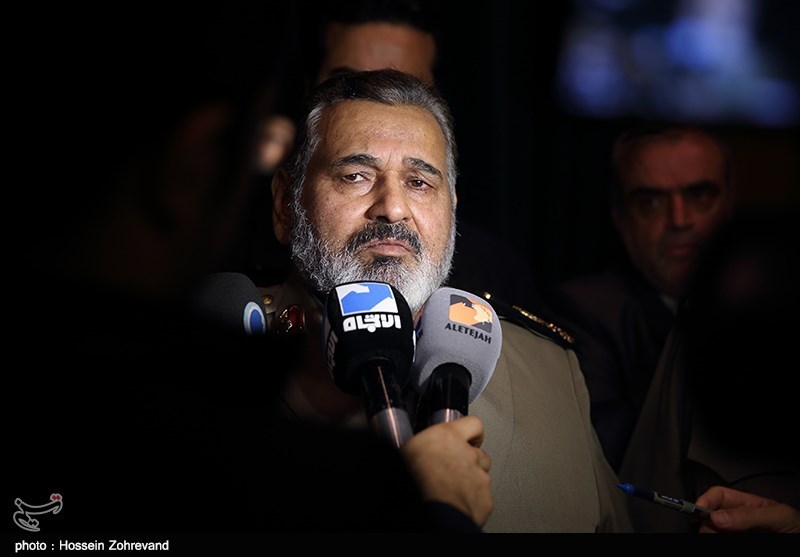[caption id="attachment_131441" align="alignright" width="205"] Iranian Armed Forces' Chief of Staff Major General Hassan Firouzabadi.[/caption]
Iranian Armed Forces' Chief of Staff Major General Hassan Firouzabadi.[/caption]
TEHRAN (FNA)- Chief of Staff of the Iranian Armed Forces Major General Hassan Firouzabadi underscored on Sunday that the hostile remarks made by Israeli Prime Minister Benjamin Netanyahu against Iran during his address to the US Congress displayed the depth of Israel's fright when speaking about Iran.
"Such words are made by Israel and the Zionist occupiers because they know that they are getting collapsed and they are not just hated by all Muslims and feel much worried in every aspect in this region, but also have lost the world people's support; thus, they naturally scream," Firouzabadi told reporters in Tehran on Sunday.
Stressing that no problems in the region can be settled without Iran's partnership, he said, "We donít see any threat posed to Iran, but the enemy threatens (us) when it feels fear."
His comments came after Netanyahu's controversial anti-Iran speech at the US Congress on Tuesday night during which he threatened to take action against Iran's peaceful nuclear program.
Stressing Iran's policy of friendship with the neighboring countries, Firouzabadi said, "We support them and donít pose any threat to them."
He underlined Iran's special support for Iraq's security, and said, "Iran is not seeking any special self-interest in Iraq as we assume Iraq's security and honor as our own security and honor."
Firouzabadi also dismissed allegations about dispatch of Iranian soldiers to Iraq, stressing that Tehran would not have any such plan for future either.
Elsewhere, he reiterated that Iran doesnít need nuclear weapons, and said, "It is in the interest of the westerners to approach Iran through reconciliation and reach agreement with the country."
In relevant remarks on Wednesday, Iranian Foreign Ministry Spokeswoman Marziyeh Afkham said the Israeli prime minister's Tuesday night address at the US Congress against Iran was a futile attempt to camouflage Tel Aviv's crimes in Gaza, and asked Benjamin Netanyahu to show a little respect for the world nations' power of understanding and reasoning.
"Netanyahu's remarks were repeated lies; the (Zionist) regime's hostilities towards the Iranian nation are obvious and the regime's lies have been completely revealed on the international scene," Afkham told reporters on Wednesday.
Stressing that the Zionist regime is isolated more than ever due to its repeated crimes against the Palestinians, promotion of state terrorism and violation of human rights, she said, "Such attempts that are made to make the world nations forget the crimes against the Palestinian people are wrong."
"They (the Zionists) cannot make the world community to forget the crimes in Gaza through statements and trips," Afkham said.
She stressed that no new words were heard in Netanyahu's remarks, and said, "The regime is entangled in a whirlpool of its mistakes, extremism and spread of insecurity and Netanyahu had better respect the global community's understanding and avoid repeating such words."
Afkham, meantime, downplayed Netanyahu's remarks, and said, "The Islamic Republic of Iran participates in the negotiations based on the nation's interests."
"A good agreement (with the world powers) is an agreement which includes all the rights of the (Iranian) nation," the foreign ministry presser underscored.
The Iranian and American teams of negotiators started several days of talks in Geneva late in February. Then after two days of negotiations, Iranian Foreign Minister Mohammad Javad Zarif, Head of the Atomic Energy Organization of Iran (AEOI) Ali Akbar Salehi and President Rouhani's brother and senior aide Hossein Fereidoun as well as US Secretary of State John Kerry and Secretary of Energy Ernest Moniz joined their deputies in the talks.
Then Zarif traveled to Montreux, western Switzerland, earlier this week for another three days of nuclear talks with Kerry.
Representatives of Iran and the Group 5+1 (the US, Russia, China, Britain and France plus Germany) also had deputy-level negotiations over Tehranís nuclear program in the city of Montreux following the Zarif-Kerry meeting.
The talks are expected to resume in Geneva on March 15.
Both Iran and the G5+1 negotiators have underlined that cutting a final deal before the July 10 deadline is possible.
By Fars News Agency

 QR code
QR code